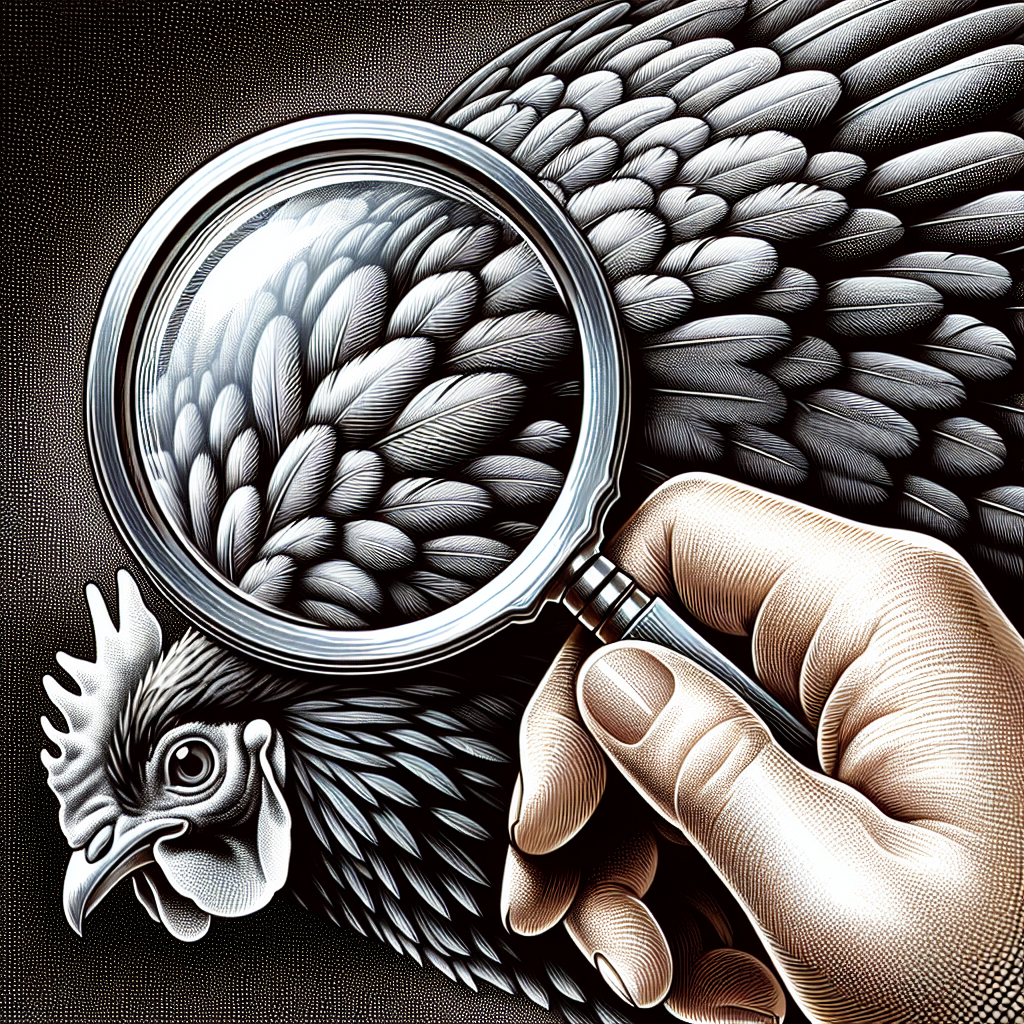In this article, you will discover practical and effective strategies to manage and maintain a harmonious flock. Whether you are an experienced poultry farmer or a novice in this field, creating a peaceful and productive environment for your flock is crucial for their health and well-being. We will explore various aspects of flock management, including proper housing, feeding, and social dynamics, providing you with the necessary knowledge to establish and sustain a cohesive and contented group of birds. By implementing these tried-and-true methods, you will ensure that your feathered friends thrive and flourish in their surroundings.
Understanding Flock Dynamics
Establishing a Pecking Order
In a flock, there is a natural hierarchy known as the pecking order. It is important to understand this dynamic as it plays a crucial role in maintaining harmony among the chickens. The pecking order determines the social ranking of each bird, with the dominant ones at the top and the more submissive ones at the bottom. By allowing the birds to establish their pecking order, you prevent unnecessary aggression and establish a sense of order within the flock.
Flock Communication
Chickens have their unique ways of communicating with one another. Understanding their forms of communication is essential in maintaining a harmonious flock. Chickens use a variety of vocalizations including clucking, crowing, and squawking to convey different messages. They also communicate through body language such as wing flapping, tail flicking, and crouching. By familiarizing yourself with these signals, you can better understand their needs and address any potential issues within the flock.
Understanding Social Hierarchies
Social hierarchies exist not only within the flock as a whole but also within smaller groups or cliques. It is crucial to recognize these social dynamics and ensure that all members of the flock have equal access to resources such as food, water, and shelter. By creating an environment that promotes fairness and prevents bullying or exclusion, you can maintain a harmonious flock where all members feel secure and cared for.
Managing Different Breeds in One Flock
If you have multiple chicken breeds in your flock, it is important to understand how to manage them together. Different breeds may have different temperaments, social behaviors, and nutritional needs. It is essential to provide adequate care and attention to each breed, ensuring they all receive the proper nutrition, space, and social interactions. By catering to the unique needs of each breed, you can maintain a harmonious and inclusive environment for all the chickens in your flock.
Providing Adequate Space and Shelter
Calculating Space Requirements
One of the key factors in maintaining a harmonious flock is providing enough space for all the chickens. Overcrowding can lead to stress, aggression, and the spread of diseases. To calculate the space requirements, allow each chicken a minimum of 4 square feet in the coop and 10 square feet in the outdoor run. Additionally, provide ample perching space, nesting boxes, and dust bathing areas. By ensuring adequate space, you promote a sense of individual comfort and minimize any territorial disputes.
Creating a Comfortable Shelter
A well-designed and comfortable shelter is crucial for the overall well-being of your flock. The coop should be secure, well-ventilated, and weatherproof to protect the chickens from predators, extreme temperatures, and inclement weather. Provide proper insulation and bedding materials such as straw or wood shavings to keep the coop clean and cozy. Regular cleaning and maintenance of the shelter are essential to prevent the buildup of parasites and diseases.
Preventing Overcrowding
Overcrowding can have detrimental effects on the flock’s health and harmony. It is important to prevent overcrowding by monitoring the number of chickens in relation to the available space. Consider the size and age of your flock when determining the appropriate number of birds. Adding more roosting bars, nesting boxes, and outdoor areas can help distribute the flock and minimize any potential conflicts. By preventing overcrowding, you create a stress-free and harmonious environment for your chickens.
Ensuring Proper Nutrition and Watering
Understanding Nutritional Needs
Providing a balanced and nutritious diet is essential for the overall health and well-being of your flock. Understanding the nutritional needs of chickens is vital to ensure they receive the proper vitamins, minerals, and protein. A good quality commercial chicken feed should make up the majority of their diet. Supplement this with fresh fruits, vegetables, and grains to promote a varied and enriched diet. It is also important to provide calcium supplementation, especially for laying hens, to support eggshell production.
Providing a Balanced Diet
To maintain a harmonious flock, it is important to provide a balanced diet that meets the specific needs of different age groups and breeds. Chicks require a higher protein content in their feed, while adult chickens need a well-balanced blend of grains. Laying hens may benefit from additional calcium supplements to support their egg-laying process. Regularly assess the nutritional content of the feed you provide and adjust accordingly to ensure your flock receives the necessary nutrients for optimal health.
Offering Clean and Fresh Water
Water is a vital component of a chicken’s diet. Ensure that clean and fresh water is readily available to the flock at all times. Regularly change and clean water containers to prevent the growth of bacteria and algae. During extreme weather conditions, provide cool water to prevent dehydration. Offering clean and fresh water not only ensures the flock’s hydration but also promotes their overall health and well-being.
Maintaining Health and Hygiene
Implementing Biosecurity Measures
Maintaining biosecurity is essential to prevent the introduction and spread of diseases within the flock. Implement strict biosecurity measures by quarantining new birds before introducing them to the flock, regularly disinfecting equipment and housing, and minimizing the flock’s exposure to wild birds or other potential carriers of diseases. By prioritizing biosecurity, you can reduce the risk of disease outbreaks and keep your flock healthy and harmonious.
Regular Health Checks
Regular health checks are crucial in identifying any potential health issues early on and taking appropriate measures to prevent further spread. Monitor the flock for signs of illness such as lethargy, loss of appetite, abnormal feces, or abnormal behavior. Inspect their eyes, feathers, combs, and feet regularly for signs of parasites or infections. By conducting routine health checks, you can maintain the flock’s overall health and take prompt action if necessary.
Managing Parasites and Diseases
Parasites can pose a significant threat to the health and harmony of your flock. Regularly check for external parasites such as mites or lice and treat them promptly using appropriate medications or natural remedies. Similarly, be vigilant for signs of common diseases such as respiratory infections or egg-related issues. Implement proper hygiene practices, provide a clean environment, and seek veterinary advice when necessary to manage and prevent the spread of parasites and diseases.
Handling Behavioral Issues
Dealing with Aggression and Bullying
Aggression and bullying can disrupt the harmony of a flock and potentially cause harm to individual chickens. If you observe aggressive behavior, separate the offender temporarily from the flock and reintroduce them after a cooling-off period. Providing more resources such as food and water stations, perching areas, and dust bathing spots can help reduce aggression by minimizing competition. It is essential to monitor the flock closely and address any aggressive behavior promptly to maintain a peaceful social dynamic.
Preventing Egg Eating
Egg eating can become a behavioral problem within a flock if not addressed early on. To prevent or curb this behavior, ensure that the nesting boxes are clean, comfortable, and adequately sized. Collect eggs frequently to prevent them from becoming a temptation for egg-eating chickens. Occasionally, provide supplemental calcium in the form of crushed oyster shell to the flock to reduce the chances of them developing a taste for eggs.
Addressing Excessive Noise and Feather Picking
Excessive noise and feather picking can indicate stress, boredom, or territorial behavior within the flock. Address these issues by ensuring the chickens have sufficient mental stimulation, exercise, and access to a varied diet. Provide toys or objects for pecking, hanging vegetables for entertainment, and opportunities for natural foraging behavior. If feather picking persists, isolate the affected bird temporarily and provide distractions such as mirrors or toys in their confinement area. By addressing these behavioral issues, you can promote a peaceful and harmonious flock.
Promoting Mental Stimulation and Exercise
Creating Enrichment Opportunities
Mental stimulation is crucial for the overall well-being of your flock. Provide enrichment opportunities such as hanging vegetables, mirrors, or chicken-friendly toys to keep them entertained and engaged. Construct obstacles or perches within the run or yard to encourage physical activity and promote natural behaviors. These enrichment activities not only provide entertainment but also prevent boredom and reduce the likelihood of aggression or destructive behaviors.
Encouraging Natural Foraging Behavior
Chickens have a natural inclination to forage and search for food throughout the day. Encouraging this natural behavior not only provides mental stimulation but also enhances their diet and reduces boredom. Create foraging areas in the yard by scattering scratch grains, mealworms, or other treats for the chickens to discover. Alternatively, use specially designed foraging toys or hidden feeding stations to simulate the behavior of foraging in the wild. By promoting natural foraging behavior, you ensure that your flock remains mentally stimulated and satisfied.
Ensuring Sufficient Daily Exercise
Regular exercise is vital for the physical and mental health of chickens. Allow them access to a spacious outdoor run or yard where they can roam and explore. Encourage free-ranging during supervised periods to provide them with opportunities to stretch their wings, scratch the ground, and engage in natural behaviors. Additionally, provide perches and obstacles within their living space to further encourage physical activity. By ensuring sufficient daily exercise, you promote a healthier, happier, and more harmonious flock.
Managing Seasonal Changes
Adapting to Weather Conditions
Different weather conditions can affect the well-being of your flock. During extreme heat, provide shade, access to fresh water, and sprinklers or misters to keep the chickens cool. In colder weather, insulate the coop, provide additional bedding, and consider using heat lamps to maintain a comfortable temperature. Regularly monitor your flock during seasonal changes and adapt their environment to ensure their comfort and well-being.
Managing Molting and Feather Regrowth
Molting is a natural process where chickens shed and regrow feathers. During this time, they may exhibit reduced egg production and increased vulnerability to cold weather. Provide a higher protein diet to support healthy feather regrowth and ensure they have access to sheltered areas to avoid any potential harm during molting. Be patient and understanding during this period, as the chickens may be more susceptible to stress or changes in behavior.
Handling Broodiness and Mating Behavior
Broodiness is a maternal instinct in hens where they become determined to hatch eggs. While this can disrupt the harmony of the flock, it is important to provide a suitable nesting area and consider allowing the hen to hatch a small clutch of eggs if desired. Manage broodiness by gently removing eggs from the nest and redirecting the hen’s attention to other activities. Additionally, ensure that mating behavior remains consensual and non-aggressive. Observing and managing these natural behaviors will contribute to the overall harmony of the flock.
Integrating New Members into the Flock
Quarantine and Observations
When introducing new birds into an existing flock, it is important to quarantine them initially. This helps to prevent the potential spread of diseases and ensures that the new birds are healthy and compatible with the existing flock. Observe the new birds closely during the quarantine period to assess their behavior, health, and compatibility with the existing flock before introducing them gradually.
Introducing New Birds Gradually
Introducing new birds gradually to the existing flock helps reduce stress and aggression. Begin by placing the new birds in a separate but adjacent enclosure, allowing them to see and get accustomed to the existing flock. Over time, gradually increase their interaction by allowing supervised face-to-face meetings. Monitor their behavior closely during these introductions and be prepared to separate any birds showing signs of aggression until a harmonious integration can be achieved.
Monitoring Behavioral Interactions
Closely monitor the behavioral interactions between new and existing flock members during the integration process. Pay attention to signs of aggression, bullying, or excessive dominance. If necessary, separate any aggressive individuals to prevent harm and allow for a smoother integration. Gradual introductions, ongoing observation, and proactive intervention will help ensure a harmonious coexistence between the existing and new members of the flock.
Addressing Flock Disturbances
Predator Prevention and Security Measures
Protecting your flock from predators is crucial in maintaining a harmonious environment. Implement security measures such as secure fencing, predator-proof coop design, and regular checks for potential entry points. Use deterrents like scarecrows, motion-activated lights, or ultrasonic devices to discourage predators. Installing an alarm system can also help alert you to any potential disturbances. By prioritizing predator prevention, you can ensure the safety and well-being of your flock.
Dealing with Noise Complaints
Chickens, especially roosters, can generate noise that may cause concerns for your neighbors. To address noise complaints, consider investing in sound insulation for the coop or modifying the coop design to reduce noise transmission. If permissible, relocate the coop to a more secluded area or invest in noise-reducing equipment such as white noise machines or ventilation systems. Regularly communicate with your neighbors to address any concerns and find mutually agreeable solutions.
Managing Environmental Stressors
Environmental stressors such as extreme temperatures, loud noise, or disruptive changes can disturb the harmony of the flock. Minimize stress by providing a calm and predictable environment for your chickens. Shield the coop from excessive noise and vibrations, ensure consistent lighting patterns, and avoid sudden changes in their living conditions. By managing environmental stressors, you can maintain a peaceful and harmonious atmosphere for your feathered friends.
Bonding with Your Flock
Spending Quality Time with Your Birds
Building a strong bond with your flock is essential for their well-being and overall happiness. Spend quality time with your chickens by hand-feeding them treats, talking to them in a calm and soothing voice, and sitting near the coop or run for observation. Allow them to become accustomed to your presence and observe their natural behaviors. By investing time and attention into bonding with your flock, you create a trusting and harmonious relationship.
Building Trust and Establishing Leadership
Building trust with your flock is achieved through consistent and positive interactions. Avoid sudden movements or loud noises that may startle them and approach them calmly and gently. Establish leadership by being consistent in your care routines, providing ample resources, and maintaining a calm and confident demeanor. By building trust and establishing yourself as a reliable leader, you foster a sense of security and harmony within the flock.
Observing and Interacting with the Flock
Regular observation and interaction with your flock are necessary to monitor their behavior, health, and overall well-being. Take the time to observe their interactions, vocalizations, and body language to identify any potential issues or changes. Participate in their daily activities, such as offering treats, engaging in play, or simply sitting near the coop to observe their social dynamics. By actively engaging with and understanding your flock, you deepen the bond and promote a harmonious relationship.
In conclusion, managing and maintaining a harmonious flock requires understanding flock dynamics, providing adequate space and shelter, ensuring proper nutrition and watering, maintaining health and hygiene, handling behavioral issues, promoting mental stimulation and exercise, managing seasonal changes, integrating new members into the flock, addressing flock disturbances, and bonding with your flock. By following these guidelines and providing the care and attention they need, you can create a peaceful and harmonious environment for your flock of chickens.




